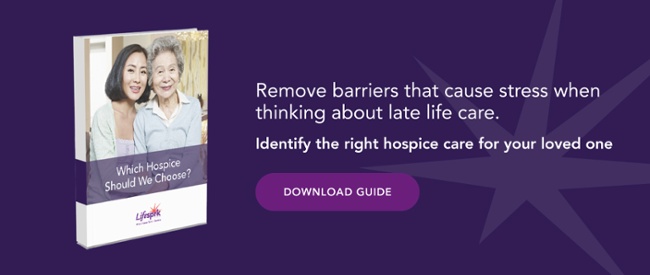
When you’re first diagnosed with a chronic or life-limiting disease, it’s natural to feel scared. You probably have a lot of fears and even more questions. How is the rest of your life going to go? Will you be in pain? Will your family be okay?
Take hope. You’re not alone. Palliative care and hospice care are truly great options that minimize your discomfort and help you and your family move through this journey together.
You do have some choices to make. And we’re about to explore your options. First, though, a peek back at how we got here.
The Late-Life Story
Once upon a time…
When we were very sick, we were told to go to the hospital. And we did. Doctors and nurses decided how we should be cared for. We were expected to die in the hospital, probably in some amount of pain and missing the life that had always made us happy.
Then in the late 1970s, along came the hospice movement…Hospice care was palliative in nature (not intended to cure disease but to treat symptoms and bring comfort).
It revolutionized how our end-of-life story might unfold. We began to decide for ourselves what we wanted our final months to look like. With loved ones at the heart of the experience, and experts committed to easing our symptoms and helping us find peace, dying could become a comfortable, meaningful way to exit this life.
A couple of decades later, that same compassionate care expanded to help more people.
Hospitals began to create stand-alone palliative programs, embracing the same quality-of-life approach as hospice in caring for us—but earlier in our disease! Why wait until we had only months left to live? If we were suffering with a chronic or life-limiting illness, we could now have a palliative care team easing our symptoms and enhancing our day-to-day living.
How Are Hospice Care and Palliative Care Related?
You can think about it like this:
Palliative care is specialized medical care for people suffering with a severe, chronic illness. The focus is on symptom management and quality of life rather than curing a disease. Often used for chronic conditions with no cure, palliative care can also be used side-by-side with curative efforts.
Hospice care is specialized palliative care for people who are likely in their last 6 months of life.
In other words, hospice and palliative care both offer compassionate care to people with life-limiting illnesses. But palliative care can be offered in two different ways: As a vital component of hospice care OR as its own separate area of medical practice.
What They Share in Common
Palliative care and hospice care BOTH:
- Give you a team of experts that focuses on improving your overall quality of life
- Care for you as a whole person with needs, hopes, and challenges related to your illness
- Put your personal wishes at the center of your care
- Ease your pain and other distressing symptoms such as:
- Nausea
- Shortness of breath
- Fatigue
- Loss of appetite
- Trouble sleeping
- Constipation
- Support you physically, emotionally, and spiritually
- Relieve stress on you and your family
- Work with you to clarify your care options and goals
- Coordinate your care across your many healthcare providers
So How Are Palliative Care and Hospice Care Different
|
PALLIATIVE CARE |
HOSPICE CARE |
| You may choose palliative care… as soon as you’re diagnosed with a chronic or life-limiting illness (e.g. cancer, COPD, congestive heart failure, kidney failure, AIDS, Alzheimer’s).
|
You may choose hospice care… as soon as your doctor feels your life expectancy may be 6 months or less.
|
| If you’re receiving curative care (treating your disease) … you may also have a team of palliative experts focusing on your overall quality of life.
|
If you’re receiving curative care (treating your disease) … hospice is not for you. Hospice care focuses on your overall quality of life once you’ve decided to refocus your care from curative to comfort-based. |
| Your palliative care team… can vary, but it’s usually made up of specially trained doctors, nurses, social workers, chaplains, and other specialists as necessary to relieve your symptoms and improve the quality of life for you and your family. | Your hospice care team… always includes a hospice medical director, primary care physician, registered nurse care manager, social worker, chaplain, bereavement counselor, home health aides, and hospice volunteers. The team also brings in other specialists as necessary to relieve your symptoms and improve the quality of life for you and your family.
And more, hospice is a specialized kind of palliative care. Everyone on your hospice team has a rich depth of experience in guiding people through the end of their lives. They understand your needs, fears, and hopes as you’re getting ready to leave this world. And they know how to comfort and support the people who love you—and are about to lose you. Hospice also offers bereavement support to your family for a full year after your death.
|
| You get palliative care… most often in hospitals. But it’s becoming more common in cancer centers, outpatient clinics, assisted living and skilled nursing facilities, and some doctors’ offices. Some palliative care teams will also visit your home. | You get hospice care… wherever you call home. It’s always available to you, no matter where you live (including assisted living and skilled nursing facilities, and hospice homes). |
| In terms of coverage… palliative care isn’t as widely covered as hospice. Medicare and private insurance plans may cover most medications and services but not all. You’ll want to check your personal coverage for specifics.
|
In terms of coverage… Medicare and Medicaid both cover hospice care in full. The Veteran’s Administration and most private insurance plans also cover all hospice care costs (or charge only minimal co-pays).
|
“When palliative care is done right, the idea of beginning hospice care isn’t a shock,” says Jen Blazek, BSN, RN, Lifespark Hospice Administrator,. “It feels like a natural progression into the hands of people who are continuing your palliative care AND helping you find your way to a good, meaningful death experience.”
How Do I Choose?
Should you choose hospice care once your remaining life can be measured in months, not years? It depends.
Beginning hospice is a good option for you if:
- Treatments to cure your disease are no longer working, or you no longer want to continue the treatments because of how they make you feel
- You care more about the quality of every day you have left than enduring treatments that are not very effective. (In fact, many studies show that ending futile treatments can actually help you live longer.)
- Your frequent hospital, ER, and doctor visits are ruining your peace of mind
Continuing with palliative care is a good option for you if:
- You want to do everything in your power to live as many days as possible, whatever the quality of those days
- You’re comfortable with the idea that continuing the fight for life may eventually involve extreme measures
Other Reasons You May Want to Choose Hospice Care
Once you begin hospice, you can look forward to:
- Quick access to a wide variety of medical equipment (e.g. a hospital bed, oxygen), medications, and supplies at no cost to you
- Medical experts you can call 24/7
- A team well-versed in the dying process – like Lifespark Hospice – that teaches your family how to care for you
- Home health aides to help you with personal cares, meal preparation, and light housekeeping if you need them
“There’s a lot of peace that comes when a person switches to hospice care,” says Jen.. “They’ve stopped the aggressive treatments, surgeries, and trips to the ER. They’re no longer in the battle. Life ahead with their family is about to become a lot easier in so many ways.”
If You Decide on Hospice Care
How do you know what hospice provider is right for you? Download our eBook, ‘Which Hospice Should We Choose,’ as a starting point. Reach out 24/7 to our hospice experts for support, guidance, and to schedule a consultation.




